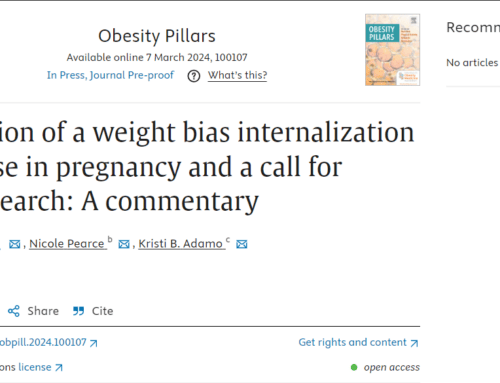Our Ask an Expert series is your opportunity to engage with world-class obesity experts at Obesity Canada. Each month, we will solicit questions for some of Canada’s top researchers and health professionals to answer. This month, it’s Dr. Sean Wharton, medical director of the Wharton Medical Clinics in Southern Ontario. Dr Wharton’s research focuses on bariatric medicine and type 2 diabetes, and he has published or contributed to many peer-reviewed articles on a range of topics in these fields. He has also led research investigating the importance of patients having access to trained professionals in weight management, and is a strong advocate for government-funded medical care for patients with increased weight.
Q1: As a retired woman who has been struggling with my weight for a good part of my life, I have been making a very direct effort to manage my weight now that I have some free time. I however have been reading and hearing conflicting information and I hope you can clear this up a little bit. As I have been overweight for so long, I have heard that the internal organs can be “displaced” by the excess weight. Is this true? And if so, is it safe to lose weight and move them around again? What would be a safe weight to try to aim for?
Dr. Wharton: Thanks for this question. The internal organs are moved around by lots of things, even a big meal. Certainly there is fat infiltration in the organs when there is excess weight. There is no concern with regards to losing weight and the shifting of organs. Organs find their best spot based on what is offered up to them. There will only be benefit to losing the weight and decreasing the adipose (fat) in the internal organs.
Q2: What are the available treatment options available in Canada for effective long-term weight loss? What surgical options are the most effective and what medications are approved? Thank you.
Dr. Wharton: Great question. If you qualify for surgery the most effective surgery is what is called the biliopancreatic diversion with duodenal switch. This is invasive and not done in many centres. The next most effective and, in fact, the most common surgery is the gastric bypass. The sleeve gastrectomy is also effective, and your surgeon can decide which one is best for you, if you qualify. The lap band surgery is not effective and not recommended. Medications include orlistat, liraglutide and bupropion/naltrexone. Orlistat is minimally effective while the other two have been shown to be effective in clinical trials. I also highly recommend cognitive behavioural therapy (CBT) treatment for patients for support with behaviour changes.
Q3: Hello Dr. Wharton. There are many medications out there that cause weight gain, like some antipsychotics or medications for depression. What options does and individual have if they rely on such a medication but also struggle with their weight? How would you suggest a patient approach this concern with their doctor?
Dr. Wharton: I don’t suggest that you stop taking your medication, but instead talk to your doctor about possible alternatives that may result in less weight gain. If there are no alternatives then weight management options, such as lifestyle treatment supported by CBT, medications or surgery can help. Metformin has been shown to help with weight loss and improve metabolic health for patients that take psychiatric medications that cause weight gain.






